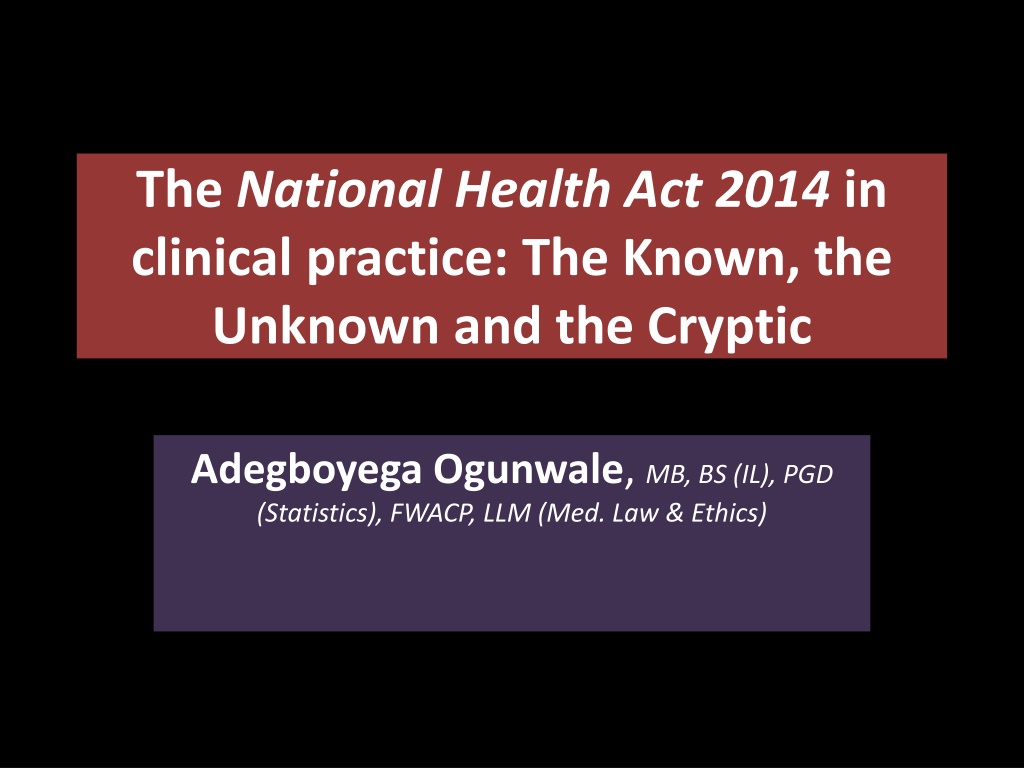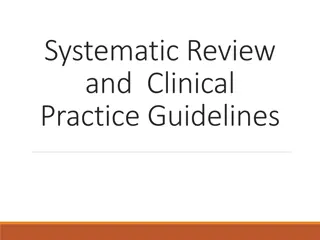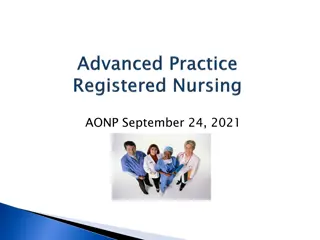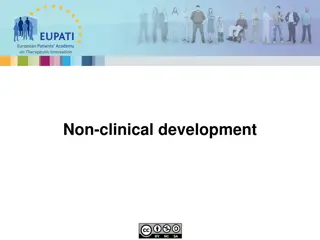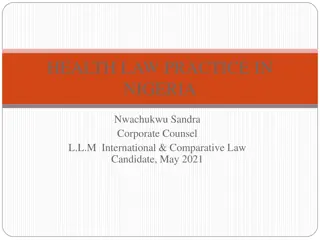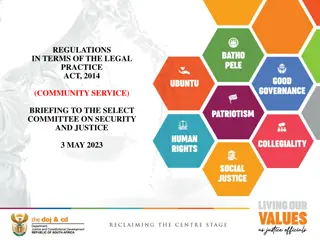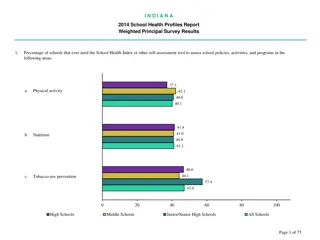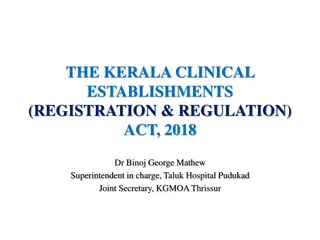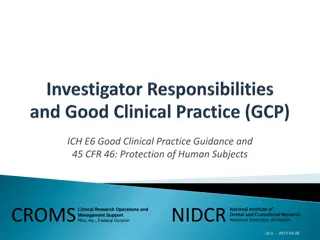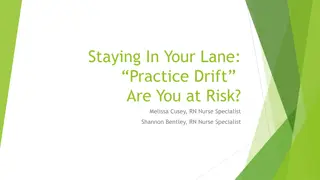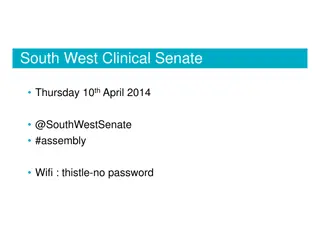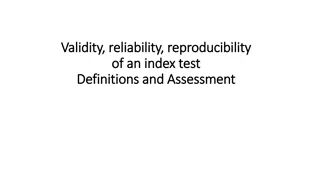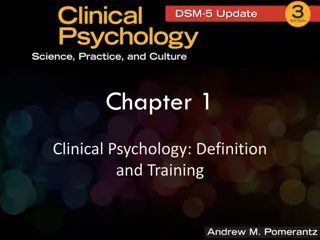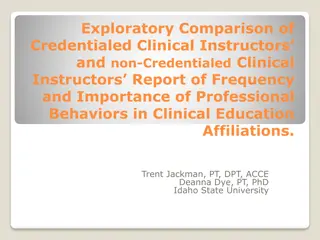The National Health Act 2014 in Clinical Practice Overview
The National Health Act 2014 in Clinical Practice delves into the framework, regulations, and standards of Nigeria's healthcare system. This landmark Act covers responsibilities, rights, research, and specific provisions like emergency treatments. It highlights key sections and areas of focus crucial for healthcare professionals and facilities.
Download Presentation

Please find below an Image/Link to download the presentation.
The content on the website is provided AS IS for your information and personal use only. It may not be sold, licensed, or shared on other websites without obtaining consent from the author.If you encounter any issues during the download, it is possible that the publisher has removed the file from their server.
You are allowed to download the files provided on this website for personal or commercial use, subject to the condition that they are used lawfully. All files are the property of their respective owners.
The content on the website is provided AS IS for your information and personal use only. It may not be sold, licensed, or shared on other websites without obtaining consent from the author.
E N D
Presentation Transcript
The National Health Act 2014 in clinical practice: The Known, the Unknown and the Cryptic Adegboyega Ogunwale, MB, BS (IL), PGD (Statistics), FWACP, LLM (Med. Law & Ethics)
Introduction A landmark event occurred in Nigeria on Friday, 31stOctober, 2014 when the much publicized National Health Act received Presidential assent under the hand of Dr. Goodluck Ebele Jonathan, GCFR Even Mr President (as he then was) and the Nigeria that he superintended have always been a brilliant mix of the known, the unknown and the cryptic indeed. To say anything further will certainly be scandalous! Anyway, we got a good Act which can be better and some day, could be best.
The National Health Act Title: An Act to Provide A Framework for the Regulation, Development and Management of a National Health System and Set Standards for Rendering Services in the Federation, And Other Matters Connected Therewith, 2014. History outline: First reading: Tuesday, 2ndOctober, 2012 Second Reading: Wednesday, 12thDecember, 2012 Third Reading & Passage: Wed., 19thFeb., 2014 Presidential Assent: October 31, 2014 3
The National Health Act 2 Arrangement: Part I: Responsibility for health and Eligibility for health Services and establishment of National Health System (Nigerian NHS!) Part II: Health Establishments and Technologies Part III: Rights and Obligations of Users and Healthcare Personnel Part IV: National Health Research and Information System Part V: Human Resources for Health 4
The National Health Act 3 Part VI: Control of Use of Blood, Blood products, Tissue and Gametes in Humans Part VII: Regulations and Miscellaneous Provisions 5
Areas of focus in clinical practice Main sections of emphasis: Sections 20-30 Other relevant sections: Section 38 Section 40 Section 43 Section 45: Industrial dispute in the health sector Section 48
Emergency treatment under the Act Covered in section 20 A health care provider, health worker or health establishment shall not refuse a person emergency medical treatment for any reason whatsoever (emphasis mine) Contravention: guilty of an offence; fine of N100,000 or six months imprisonment or both Cryptic OR unknown: s. 64 defines reasonable cause as any extenuating circumstance which prevents the healthcare provider, etc. from providing emergency medical treatment
Does compliance with s. 20 differentiate private from public health establishments? No. So, who bears the cost of mandatory treatment on emergency basis in private Hs? Note: s. 48(1)(b): consent may be waived for medical investigations and treatment in emergency cases although this relates directly to removal of tissue, blood or blood products from living persons extent of application??
Rights of users and providers of healthcare Covered in section 21 Human rights: apply to both users and providers Ethical duty to protect the rights of patients Autonomy Beneficence Non-maleficence Justice: in the distributive sense
Do patients have rights? Patients are primarily human beings before they become ill. This shared humanity makes it clear that they have rights. International declarations and conventions indicate this position: WHO Constitution WHO Declaration of Alma-Ata Universal Declaration of Human Rights (1948), African Charter, Nigerian Constitution (1999 as amended) International Covenant on Civil and Political Rights and the International Covenant on Economic, Social and Cultural Rights (1966) UN Convention on the Rights of the Child (1989) UNESCO Universal Declaration on the Human Genome and Human Rights (1997) UNESCO Universal Declaration on Bioethics and Human Rights 10
Do patients have rights? 2 A summary of rights in healthcare (Mason & Laurie, 2013): Right to be respected and treated with dignity Right to the highest attainable standard of physical and mental health and associated right to healthcare Right to consent and to refuse consent to medical intervention Right not to be subjected to medical or scientific experimentation without consent Right to equality under the law Right to protection against arbitrary interference with privacy or with the family Right to enjoy the benefits of scientific progress and its application The protection of the rights of vulnerable persons 11
Do patients have rights? 3 The EU Charter of patients rights (2002) provides 14 key rights in the healthcare context: 1. 2. Right to preventive measures Right to Access 3. 4. Right to information Right to consent 5. 6. Right to free choice Right to Privacy and confidentiality 7. 8. Right to respect of patient s time Right to observance of quality standards 9. 10. Right to safety Right to innovation 11. 12. Right to avoid unnecessary suffering and pain Right to personalized treatment 13. 14. Right to complain Right to compensation 12
Do healthcare providers have rights? Section 21: Right to protection from injury or damage to the person and property of healthcare personnel Right to protection from disease transmission e.g. Ebola and the need for PPE + other protective steps Right to refuse treatment of physically or verbally abusive service user or user who sexually harasses provider; may report such user to appropriate authorities Conscientious objection e.g. to assume care of JWs who may not cooperate with treatments such as BT
Indemnity of staff Section 22 Applies only when staff is not found negligent Unknown: this law is silent as to what happens if healthcare provider found negligent while following institutional policy Cryptic: Raises the need for proper indemnity insurance for key healthcare professionals
Healthcare users consent Covered under section 23 Emphasis appears to be on full information or disclosure to patient Voluntariness and capacity not adequately addressed (Compare with instruments such as Nuremberg Code (1949), Declaration of Helsinki (as amended, 2013), the UK MCA (2005) Where does this law stand on the matter of substituted judgment? Will it be proxy consent or best interest?
Incompetent adults s. 26(2)(b)(ii): consent for disclosure of confidential material may be provided by guardian or representative s. 64 (interpretations): for patients incapable of taking decisions, user (i.e. proxy for the patient) includes: SPOUSE or in the absence of the spouse, PARENT, GRANDPARENT, ADULT CHILD (NOT LESS THAN 18), BROTHER, SISTER OR ANOTHER PERSON AUTHORISED BY LAW TO ACT ON BEHALF OF THE PATIENT (no particular order defined).
Consent and children s. 64: when user is below the age of majority , consent may be provided by proxy who may be patient s parent or guardian or another person authorised by law to act on behalf of the child. What is this age: 16, or 18? Where does this law stand in the arena of Gillick competence ? Is there a direct translocation of English Jurisprudence into Nigeria in this matter? MDCN (2004) seems to believe so (s. 39, pp. 49-50!)
Informed consent: relevant case law Okonkwo v. MDPDT (Court of Appeal, Lagos; June, 1999) Ob/Gyn charged with causing death (by negligence) of a 29 year old female with Anaemia, a member of the Jehovah s Witnesses; she refused blood and was referred to Okonkwo (also a JW). He kept her in his clinic for 4 days (without blood transfusion) and she died. He was ready to give blood (pt refused); he gave other treatments MDPDT verdict guilty and was suspended from medical practice for 6 months 19
Allowing the appeal: The court held:- If a patient refuses to give informed consent, the law is that the medical practitioner will not proceed to administer the medical treatment. Otherwise, the practitioner will be liable for assault or other forms of trespass to the person and for any other mental or physical injury or damage which may occur 20
Having regard to sections 35(1) (freedom of thought, conscience, religion) and 36(1) (freedom to hold opinions) of the Constitution of the Federal Republic of Nigeria (1979) and other personal rights of the individual, an adult of sound mind has a right to choose what medical treatment made available to him subject to and when to refuse The courts should not allow medical opinion of what is best for the patient to over-ride the patient s right to decide for himself 21
Justice Benjamin Cardozo in Schloendorff v. Society of New York Hospital, 211 N.Y. 125, 105 N.E. 92 (1914) held: Every human being of adult years and sound mind has a right to determine what shall be done with his own body; and a surgeon who performs an operation without his patient's consent commits an assault for which he is liable in damages. This is true except in cases of emergency where the patient is unconscious and where it is necessary to operate before consent can be obtained . 22
Williamson v East London and City Health Authority (1998) 41 BMLR 85: plaintiff consented to removal and replacement of a leaking breast implant. Doc found a more serious condition during surgery and conducted mastectomy. Doc found liable for causing injury; 20,000 pounds awarded 23
Consent for minors: For those minors that lack mental capacity, consent should be sought from parents (see Glass v United Kingdom (2004) 39 EHRR 341) Minors that are emancipated or mature, having mental capacity can provide consent on their own (Gillick v West Norfolk and Wisbech Area Health Authority and another [1986] 1 AC 112) Consent for those with mental disorders rendering them incompetent: Find out if they have executed powers of attorney; if so, consult relevant attorney. If not, treatment should be carried out based on the best interests principle 24
When adults refuse consent to treatment: Wishes of patient to be respected even if it will lead to death Re T (adult ) (refusal of medical treatment) [1992] 4 All ER 649: pregnant JW who refused blood transfusion. Decision to transfuse was only justifiable because she was found to lack mental capacity Re C (adult: refusal of medical treatment) [1994] 1 All ER 819: 68 yr old schizophrenic prisoner who refused amputation despite life-threatening gangrene. Court found him capable to refuse and amputation was not done. 25
Level of information to be disclosed for consent to be informed : This should follow a prudent patient standard. What amount of information would a reasonable person wish to have? Take into account, the patient s concerns (Reibl v Hughes (1980) 114 DLR (3d) 1). The General Medical Council (UK) offers this guidance: In deciding how much information to share with your patients you should take account of their wishes. The information you share should be in proportion to the nature of their condition, the complexity of the proposed investigation or treatment, and the seriousness of any potential side effects, complications or other risks 26
Health Records Section 24-25: creation of health records Records must be kept for every user This suggests that documentation of every clinical transaction is key Avoid corridor consulting
Confidentiality Section 26 covers this important medico-legal issue Cryptic: What are the grounds for derogation from this responsibility? Public health: What if the public is not public in the real sense but a single potential victim clearly identified?
Medical Confidentiality Legal and ethical duty Legal duty: Both under statute(s) and common law Common law: contract, equity and tort Current statute: NHA (2014) Ethical premise: Basic ethical principles Hippocratic oath Other declarations Code of medical ethics (MDCN, 2004; 2008) 29
Common law duty of Confidentiality Developed through cases in which patients sued physicians for alleged disclosure of confidential information without justification(Mae, 2004) 1. Contract: implied contractual duty of confidentiality in a consultation encourages patients to disclose sensitive information; no fear of disclosure without consent (see Parry Jones v Law Society (1969) Ch 1 at 7 30
Common law duty of Confidentiality 2 2. Equity: patient relies in good faith on the physician to keep secret secret. 3. Tort: there is a general duty on the physician not to cause forseeable harm to another through disclosure of confidential material [Furniss v Fitchett (1958) NZLR 396] 31
Furniss v Fitchett (1958) NZLR 396] Mr. & Mrs. Furniss were both patients of Dr. Fitchett. Mrs. seemed to exhibit paranoia towards Mr. and confided in Dr. Fitchett. The paranoid symptoms led to marital disharmony. Mr. contacted solicitor and asked dr. for a medical report on his wife. Dr. issued medical report [without patient s consent] indicating that wife could be mentally ill; report came up during separation proceedings in court. Mrs. Sued doctor and the doctor was liable for breach of confidentiality and harm to patient. 32
Confidentiality and professional conduct Nature of the obligation of confidentiality: Court of Appeal in A-G v Guardian Newspapers Ltd [1990] AC 109, it was upheld that there was a public interest in a legally enforceable protection of confidences received under a notice of confidentiality. This is applicable to all confidential material. Hunter v Mann ([1974) QB 767 at 772: the doctor is under a duty not to [voluntarily] disclose, without the consent of the patient, information which he, the doctor, has gained in his professional capacity 33
Confidentiality as per the Code of Medical Ethics in Nigeria Features as rule 44 under Part D: Improper relationship with colleagues or patients. Salient points: Information about the patient during the course of patient-doctor relationship constitutes a secret and such must in no way be divulged by him to a third party (not very practical in a teaching hospital!) 34
Medical records to be kept away from any person who is not a member of the profession [contentions: no reference to nurses, medical records staff, social workers, occupational therapists, etc. who may be clinical staff but not members of the profession] The ethic covers criminal abortion, venereal disease, attempted suicide, concealed birth, and drug dependence. Reasons for disclosure of information (not necessarily breach!): education, research monitoring, public health surveillance, clinical audit, administration and planning. 35
Steps to take before disclosure of Confidential information Seek patient s consent: whenever possible, whether or not you judge that the patient can be identified from the disclosure. Volenti non fit injuria Maintain data anonymity: cryptic utilization of clinical material for teaching or publication in professional journals; Keep disclosures to the minimum necessary: need to know basis 36
Limits to Confidentiality: the proper breach Disease notification: no consent of patient needed Clear advice to patients on the breach which will attend medical exams for employment, insurance, security or determination of legal competence discretionary breach of confidentiality to protect the patient or the community from imminent danger 37
Limits to Confidentiality: the proper breach 2 Disclosure of information on legal minor to parents or guardians: take note of Gillick competence which is recognized by council in relation to consent (MDCN, 2004; Gillick v West Norfolk and Wisbech Area Health Authority and another [1986] 1 AC 112). Disclosure during court proceedings (strictly under protest testimonial privilege): subpoena duces tecum and subpoena ad testificandum When the patient sues/accuses the doctor in his professional capacity 38
Practical Dilemmas w.r.t Confidentiality Consent to publish Patient s best interests The doctor balancing private interest with public good Confidentiality in HIV infection: stigma, sexual connotation of the disease, association with drug addiction; not yet a notifiable disease Confidentiality within the family Confidentiality and death details on death certificate? 39
Relevant Case 1 W v Egdell [1990] 1 All ER 835: A patient in a secure hospital sought a review of his case in order to obtain transfer to another a regional hospital. His lawyers obtained a report from an independent psychiatrist report unfavourable and was not tendered; application was aborted. Pt however due for routine review of detention order. 40
Relevant Case 1 contd Doctor sent separate report to the Medical director of the hospital and the home office. Sued for breach of confidentiality Trial judge and Appeal court found for the defendant: disclosure was in public interest patient had committed multiple homicides in the past. 41
Relevant Case 2 Case Note 210870 [2010] NZ Priv Cmr 24: A medical centre disclosed health information to a patient s former partner. Both partners (X & Y) were both patients of the facility who were involved in court proceedings after the breakdown of their relationship. X visited centre with her new partner and asked for the family file. Centre mistakenly thought her new partner was Y and disclosed sensitive information about Y s anxiety disorder. X used this information against him in the family court 42
Relevant Case 2 contd Medical centre was investigated by the Privacy Commissioner and they were liable. Remedies: centre apologised, agreed to pay compensation and to provide Y and his children with free medical services for a set time. 43
Relevant Case 3 Director of Human Rights Proceedings v Henderson [2011] NZHRRT 1 General practitioner disclosed information about a patient who was on a methadone programme (drug abuse treatment) to a senior nurse at patient s place of work. He believed pt had displayed drug-seeking behaviour, had previous convictions for drug offences and was mistrusted by police. 44
Relevant Case 3 Tribunal found that with the information available to the doctor at the material time, he did have reasonable grounds to regard a threat that was imminent and that disclosure to someone responsible would respond to and mitigate the threat. Tribunal found his disclosure justified and he was not liable for breach of the Health Information Privacy Code. 45
Tarasoff 1: A confidentiality dilemma Tarasoff v Regents of University of California, 551 P 2d 334 (Cal, 1976) Prosenjit Poddar, a student at University of California was in psychotherapy and he told his therapist that he intended to kill a young lady, Tatiana Tarasoff who had rejected his advances. Therapist informed campus police but Poddar denied the threat during interview. Nothing else was done Poddar left therapy and two months later, murdered Tatiana Tarasoff 46
Tarasoff 1: A confidentiality dilemma 2 Victim s family sued the university which was running the clinic The Californian Supreme Court ruled that the therapist had a duty to warn the intended victim and established a doctrine that justified breach of confidentiality in exceptional circumstances A similar scenario involving HIV transmission may be found in Reisner v Regents of the University of California (1995) 37 Cal Rptr 2d 518. 47
Access to records Covered under sections 27-29 Protection of health records (s. 29)
s. 27: disclosure of record to other healthcare provider or health establishment when it is in the interest of the patient s. 28: use of records for treatment, teaching/research and the conditions to be applied s. 29: Protection of health records by setting up control measures to prevent unauthorised access to the records and to the storage facility in which, or system by which, records are kept
Offences under s. 29: failure in protecting records, falsification of records, unauthorised creation, modification, destruction or copying, unauthorised data linkage, unauthorised electronic connection to electronic data, unauthorised modification of electronic data Penalty: punishable by two year imprisonment or a fine of N250,000.00 or both
